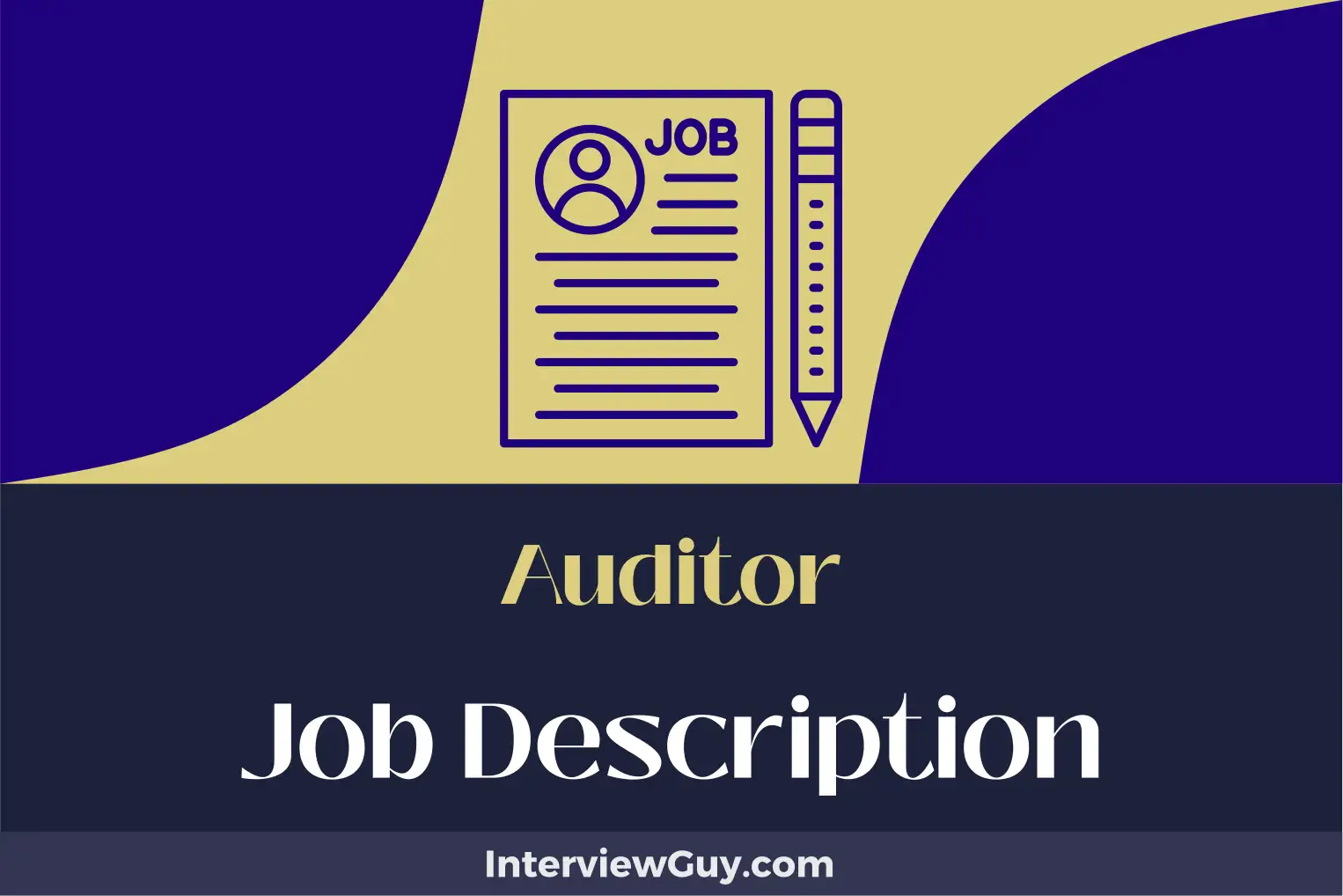Auditor Job Description [Updated for 2026]

In the financially complex landscape of the 21st century, the demand for auditors has never been greater.
As business operations and financial transactions grow increasingly intricate, the cry for skilled professionals who can scrutinize, analyze, and ensure financial integrity resounds louder.
But what does it really mean to be an auditor?
Whether you are:
- A job seeker trying to comprehend the core of this role,
- A hiring manager attempting to outline the perfect candidate,
- Or simply curious about the day-to-day responsibilities of an auditor,
You’ve come to the right place.
Today, we present a customizable auditor job description template, crafted for easy posting on job boards or career websites.
Let’s dive right into it.
Auditor Duties and Responsibilities
Auditors perform an array of tasks related to financial record examination, internal control assessment, risk management and compliance with regulations.
They ensure that companies or individuals are maintaining accurate and honest financial records.
Auditors are primarily responsible for conducting in-depth reviews and evaluations of financial systems and operations, with daily duties and responsibilities including:
- Examining financial statements to ensure they are accurate and comply with laws and regulations
- Inspecting account books and accounting systems for efficiency and use of accepted accounting procedures
- Evaluating internal controls to ensure they are effective in managing risks and protecting assets
- Preparing reports and document findings and recommendations
- Conducting follow-up audits to ensure management has addressed audit findings
- Computing taxes owed, prepare tax returns, and ensure prompt payment
- Reviewing data about material assets, net worth, liabilities, capital stock, surplus, income, and expenditures
- Examining records and interview workers to ensure recording of transactions and compliance with laws and regulations
Auditor Job Description Template
Job Brief
We are seeking a highly-analytical Auditor to join our dynamic team.
The Auditor’s responsibilities will include examining financial statements, evaluating internal controls, and performing risk assessments within a company or organization.
The ideal candidate will have a strong understanding of auditing principles and procedures, excellent attention to detail and strong analytical skills.
They should be objective, demonstrate integrity and have a strong commitment to ensuring a company’s financial compliance.
Responsibilities
- Perform and control the full audit cycle including risk management and control management over operations’ effectiveness, financial reliability and compliance with all applicable directives and regulations
- Determine internal audit scope and develop annual plans
- Obtain, analyze and evaluate accounting documentation, reports, data, flowcharts etc.
- Prepare and present reports that reflect audit’s results and document process
- Identify loopholes and recommend risk aversion measures and cost savings
- Maintain open communication with management and audit committee
- Document audit findings and prepare thorough reports that summarize audit work
- Conduct follow up audits to monitor management’s interventions
- Engage to continuous knowledge development regarding sector’s rules, regulations, best practices, tools, techniques and performance standards
Qualifications
- Proven work experience as an Auditor
- In-depth understanding of auditing and control practices
- Updated knowledge of applicable laws and regulations
- Proficient in MS Office (especially Excel) and accounting software
- Strong mathematical and analytical skills
- Attention to detail
- Excellent communication skills, both written and verbal
- BSc degree in Accounting or Finance; master’s degree and professional certification (e.g., CPA, CMA, CGA) are a plus
Benefits
- 401(k)
- Health insurance
- Dental insurance
- Retirement plan
- Paid time off
- Professional development opportunities
Additional Information
- Job Title: Auditor
- Work Environment: Office setting with occasional travel for on-site audits. Flexibility for remote work may be available.
- Reporting Structure: Reports to the Audit Manager.
- Salary: Salary is based upon candidate experience and qualifications, as well as market and business considerations.
- Pay Range: $65,000 minimum to $110,000 maximum
- Location: [City, State] (specify the location or indicate if remote)
- Employment Type: Full-time
- Equal Opportunity Statement: We are an equal opportunity employer and value diversity at our company. We do not discriminate on the basis of race, religion, color, national origin, gender, sexual orientation, age, marital status, veteran status, or disability status.
- Application Instructions: Please submit your resume and a cover letter outlining your qualifications and experience to [email address or application portal].
What Does an Auditor Do?
Auditors typically work for auditing firms, corporations, or government agencies.
They can also operate as independent contractors offering auditing services to different clients.
The primary role of an auditor is to review the financial records of an organization to ensure accuracy and compliance with established accounting standards and legal requirements.
They scrutinize the financial operations and controls to prevent and detect fraud or mismanagement.
Auditors perform a detailed analysis of financial statements, accounting records, and internal control systems.
They may also inspect invoices, tax payments, and other documents to validate a company’s financial reports.
In addition to ensuring compliance, auditors also provide recommendations for improving a company’s financial management practices.
These recommendations can include strategies for reducing costs, enhancing revenues, and improving profits.
At the end of the auditing process, they prepare a detailed report summarizing their findings, including any discrepancies or issues of concern that need to be addressed by the management.
They also communicate their findings to stakeholders, such as the management team, board of directors, and regulatory authorities.
In some cases, auditors may be required to testify in court, particularly if their audit findings are used as evidence in legal proceedings.
Auditor Qualifications and Skills
Auditors require a combination of hard skills, soft skills, and a strong understanding of financial and business standards to thoroughly review and assess the financial records of an organization, such as:
- Financial acumen and knowledge of accounting principles to review and analyze the financial documents, systems and transactions of an organization.
- Using analytical skills to identify discrepancies, fraud, or financial mismanagement within the business records, and to propose solutions for identified problems.
- Excellent attention to detail to ensure accurate and thorough auditing and financial reporting.
- Advanced computer skills for using auditing software and tools, and for preparing detailed reports and financial statements.
- Communication skills for effectively conveying the findings of an audit to management, explaining potential risks and proposing solutions.
- Interpersonal skills to work collaboratively with various stakeholders within the organization, including management, accountants, and other staff members.
- Ability to maintain confidentiality and display professional ethics in handling sensitive financial information.
- Time management skills to ensure audits are completed within specified deadlines.
Auditor Experience Requirements
Entry-level Auditor candidates usually have 1 to 2 years of experience, typically gained through internships or part-time roles in auditing or related financial departments.
This initial experience provides them with a foundational understanding of internal control systems, financial reporting and compliance regulations.
Candidates with 2 to 3 years of experience often have developed a more comprehensive understanding of business operations and have gained more proficiency in using audit software and tools.
They are expected to have the ability to perform independent audits and create detailed reports of their findings.
Auditors with more than 5 years of experience usually have a solid background in planning, performing and managing audits.
These candidates may also have experience in specialized areas such as information systems or environmental auditing.
They are often considered for senior auditor roles or management positions within the auditing department.
Additionally, experience requirements may vary depending on the industry and size of the company.
For example, auditors in the finance or healthcare sectors may need specific experience related to those industries, and larger corporations may require their auditors to have experience working with complex, multinational operations.
Auditor Education and Training Requirements
Auditors typically require a bachelor’s degree in accounting or a related field.
This degree provides a solid foundation in financial management, taxation, and auditing processes.
In addition to this, they may need to have knowledge of industry-specific software and applications.
Many employers prefer auditors who have earned a Certified Public Accountant (CPA) designation.
To become a CPA, individuals must pass a national exam and meet other state requirements.
Further, auditors may also choose to pursue additional certifications to specialize their skills in areas such as internal auditing, management accounting, or information systems.
Some of these certifications include the Certified Internal Auditor (CIA), Certified Management Accountant (CMA), and Certified Information Systems Auditor (CISA) designations.
Some positions, particularly those in leadership roles or in specific industries, may require auditors to have a master’s degree in accounting or business administration.
It’s also beneficial for auditors to engage in continuous professional development to keep up with changes in laws, regulations, and technology affecting their field.
Auditor Salary Expectations
An Auditor earns an average of $70,500 (USD) per year.
The actual salary an auditor receives can greatly depend on factors such as their level of experience, the size and industry of their employer, and their geographical location.
Auditor Job Description FAQs
What skills does an auditor need?
Auditors require strong analytical skills to evaluate financial records and detect issues.
They also need critical thinking skills to identify patterns that may indicate fraud or misuse of funds.
Excellent attention to detail and mathematical skills are also crucial for accurate data analysis and interpretation.
Additionally, auditors should have strong communication skills to report their findings and interact with team members or clients.
Do auditors need a degree?
Yes, auditors typically need a bachelor’s degree in accounting or a related field.
Some roles may require a master’s degree or additional certification, such as a Certified Public Accountant (CPA) or Certified Internal Auditor (CIA) designation.
These certifications demonstrate a higher level of competency and professionalism in the field.
What should you look for in an auditor’s resume?
When reviewing an auditor’s resume, look for a relevant educational background and any certifications.
Experience in auditing or related fields is also crucial.
Note any experience with specific auditing software or methodologies, as well as experience in your specific industry.
Check for strong analytical, problem-solving, and communication skills.
What qualities make a good auditor?
A good auditor is highly ethical and maintains independence and objectivity in their work.
They should be detail-oriented, thorough, and able to analyze and interpret complex financial data.
Good auditors also have strong interpersonal and communication skills, allowing them to effectively relay their findings and recommendations to clients or management.
Is it difficult to hire auditors?
Hiring auditors can be challenging as it requires finding individuals with the right mix of technical skills, experience, and soft skills.
It’s crucial to find someone who is meticulous, trustworthy, and capable of maintaining confidentiality.
Additionally, the high demand for skilled auditors in various industries can make the recruitment process competitive.
Conclusion
And there you have it.
Today, we’ve unveiled the true essence of being an auditor.
Surprise surprise!
It’s not all about crunching numbers.
It’s about securing financial accuracy, one audit at a time.
Armed with our tailored auditor job description template and examples from the real world, you’re all geared up to proceed.
But why halt your journey here?
Dig deeper with our job description generator. It’s your ultimate resource for creating meticulously-detailed job listings or polishing your resume to perfection.
Remember:
Every audit is a step towards financial transparency.
Let’s secure that future. Together.
Reasons to Become an Auditor (Navigating through Number Maze!)
How to Become an Auditor (Complete Guide)
Disadvantages of Being an Auditor (Endless Error Explorations)
Flex and Flourish: The Most Flexible Careers for Growth
Beyond the Traditional: Remote Jobs That Can Make You Wealthy!
The Suffering Scale: Jobs That Rate High in Hatred
Status-Boosting Careers: Jobs That Elevate Your Social Standing


![Economic Survey Field Agent Job Description [Updated for 2026]](https://interviewguy.com/wp-content/uploads/2024/05/economic-survey-field-agent-job-description-768x512.webp)

![Clinical Nurse Manager Job Description [Updated for 2026]](https://interviewguy.com/wp-content/uploads/2024/05/clinical-nurse-manager-job-description-768x512.webp)

